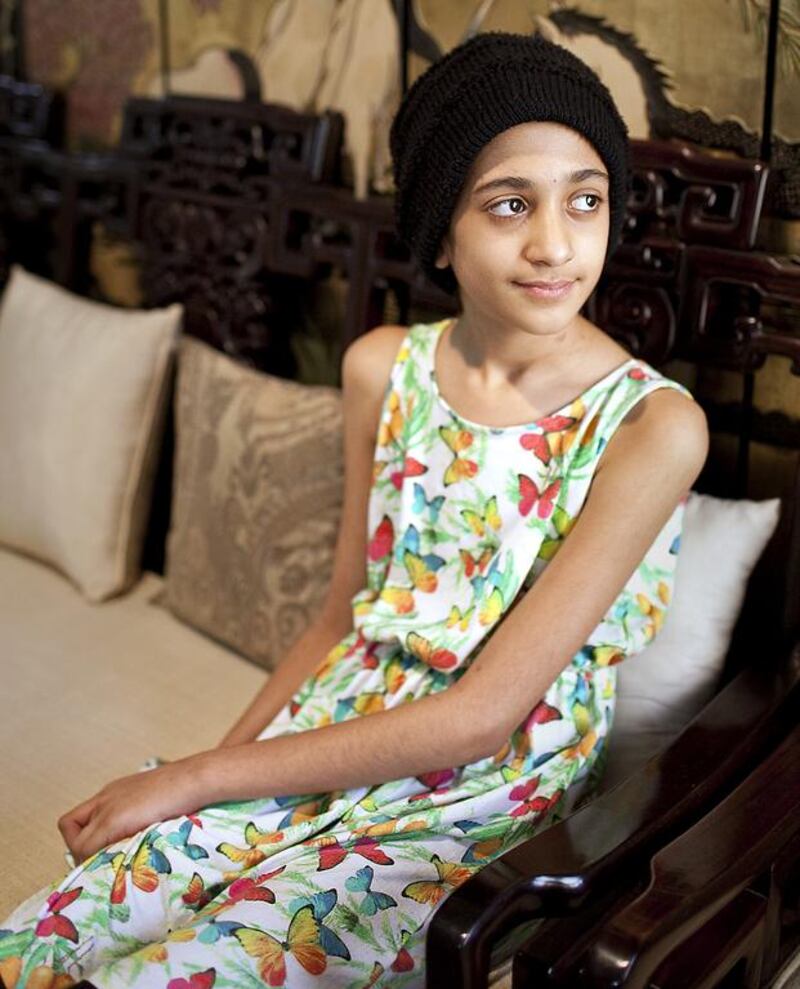ABU DHABI // Just two springs ago, 13-year-old Lujain Hussein was in the hospital for brain surgery after being assaulted at her school.
Lujain has now made a full medical recovery, though she has lost part of her vision and will likely not be able to drive, her family and doctor say.
Lujain was 11 when a group of boys pushed her into a wall at her school in April 2012, which doctors believe triggered a pre-existing condition that led her to have a brain haemorrhage.
Her family later found out she was being bullied. The incident raised awareness about the potential dangers of bullying, experts and her family have said.
“After what happened to my sister, some people are a bit like, OK, what is happening with my children? They want to know what’s happening at school,” said Mahran Hussein, her older brother, who is 24.
“It opened some eyes regarding this, for parents. I don’t know about schools.”
Doctors discovered the arteriovenous malformation (AVM) — a congenital circulatory defect in which arteries and veins are abnormally connected — when she was brought to the hospital.
“When we first saw her ... she had bleeding in a very critical part of the brain. It wasn’t certain we could stop the bleeding because the area where her haemorrhage was very deep in the brain,” said Dr Hasnain Haider-Shah, director of neurointervention for Abu Dhabi Health Services Company (Seha).
Doctors had to get special wires and catheters to access the lesion and stop the bleeding, keeping her in a coma to “make sure her brain relaxed”, he said.
Dr Haider-Shah saw her a few months ago and said she was doing fine.
“From a medical standpoint and neurologically, she was doing very good,” he said. “She had made a complete recovery.”
“These are the kinds of cases which are very fulfilling to us.”
Mahran said the family, who are Palestinian-Iranian, had been surprised when they found some doctors reluctant to make medical reports linking the schoolyard incident to Lujain’s brain haemorrhage, though they later received a medical report from Dr Haider-Shah saying so. They also have been surprised at a lack of follow-up from the school administration.
“What really annoys us is she has side effects,” he said.
“The school didn’t call, even the parents of the kids who bullied her didn’t call her.”
Lujain’s mother, Maha Abdul Khair, said her daughter at first did not want to change schools, but that she likes her new one now.
“I think she’s better now. Before, she was very quiet and didn’t want to speak with anybody,” said Mrs Abdul Khair.
Her daughter is still sometimes afraid of other children, and Mrs Abdul Khair says she worries about Lujain when she is crossing the street, asking her to make sure she turns her head to look right and left, since her left peripheral vision is limited.
“I catch her hand. I tell her, ‘Please look,’” said Mrs Abdul Khair.
The partial vision loss also led to an accident at the park, where Lujain was hit by a ball, her mother said.
Samineh Shaheem, a consultant in psychology who visits schools as part of an anti-bullying campaign she founded, said Lujain’s story had a personal effect on people in raising awareness about bullying.
“When it becomes associated with a little girl, and you see images of the little girl in the hospital, it becomes much more of a reality — an impossible reality at our doorstep,” she said, adding that she thought schools and authorities have since decided to pay more attention and take a firmer stance.
Campaigns and the use of social media have also “contributed to understanding the different dimensions of bullying”, she said.
“I think there is some heightened awareness in the schools now because of this incident,” said Dr Haider-Shah.
“Even among my own kids, they talk about these things more often.”
“Parents now, they know to ask their children if anybody bothers them in the schools,” said Mrs Abdul Khair.
Mahran and his mother said Lujain doesn’t complain, but worries she may someday feel something is missing, because of the loss of vision.
But Mahran said his mother always thanks God, “because she came back to life.”
“In the future, she may feel it more,” Mahran said. “But she’s back, you know?”
lcarroll@thenational.ae






